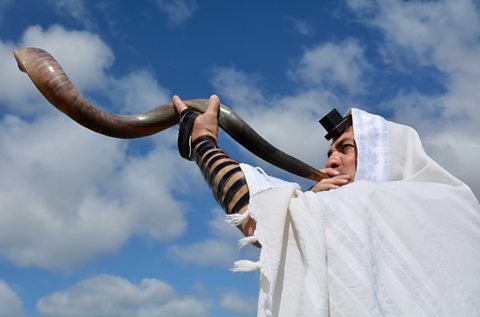Rosh Hashanah, Yom Kippur, Pesach and Sukkot
There are a number of festivals and special days within Judaism ÔÇô each with a different meaning.
Rosh Hashanah
This is the Jewish New Year which takes place over a ten-day period and ends with Yom KippurYom Kippur is the Day of Atonement. It is one day that is set aside to atone for the sins of the previous year.. Rosh Hashanah begins with the sounding of the shofarA ram's horn that is blown like a trumpet, especially during Rosh Hashanah and Yom Kippur. (horn) as a call to repentance. It represents the day God created the world, and it is on this day that Jews stand before God to repent and be judged on what they have done in the past year.

For many, this is a time for prayer and many will not sleep on the first night in order to dedicate time to prayer. There are midnight services in the synagogueBuilding for Jewish public prayer, study and assembly., those present say sorry and ask for forgiveness from God. Sweet food is eaten and there is a traditional family meal at home.
Yom Kippur
This is known as the Day of Atonement. It is a day of confession that comes at the end of Rosh Hashanah.
Yom Kippur is a day of fastingTo abstain from all food and drink, typically as a religious observance., and so before this begins a meal is eaten to prepare. Services based on confession and repentance take place at the synagogue and the people show their thanks for the love and mercy of God.
The sounding of the shofar (horn) signals the end of Yom Kippur.
Pesach
Pesach is a time for joy for the Jewish people, even though the events it recalls were a time of sadness. Outside of Israel, this lasts eight days. Within Israel, it lasts seven days. There are SederA Jewish ritual meal, held outside Israel on the first and second day of the Passover festival. In Israel it is held on the first day only. meals on the first two days. A Seder meal takes place when members of the extended family are present to retell the events of the ExodusThe second book of the Old Testament in the Bible and the second book of the five books of the Torah. It literally means 'departure'. It describes Moses leading the Israelites out of Egypt, where they had to endure slavery..
Pesach is also known as PassoverJewish festival which remembers the escape of the ancient Israelites from Egypt.. It celebrates the escape of the Israelites from slavery in Egypt over 3000 years ago. It reminds Jews that God will come to the aid of His people when needed. It is a time to remember the past, to show hope for the future, to show faith in God, to celebrate with family and to remember responsibility to others (especially those who are less fortunate).
Sukkot
Sukkot is a time when Jews remember the trek through the desert to the Promised LandThe land promised by God to Abraham (Genesis 15:18), Moses, and the Israelites. Also known as the Land of Israel.. They build makeshift huts, living in these for a week to try and recreate the conditions their ancestors lived in.

Heritage and ancestry is an important part of Jewish tradition. Sukkot allows the Jews to have a sense of belonging to their ancestors by recreating the events they lived through.